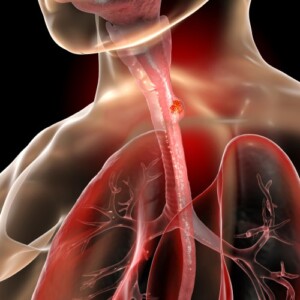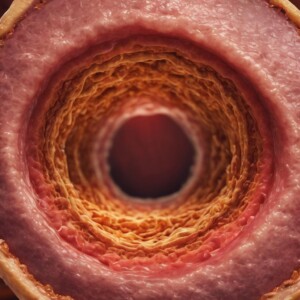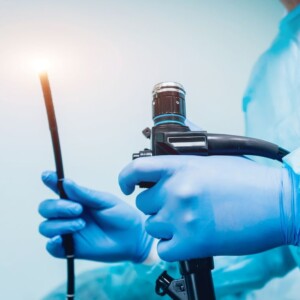






Doctor of Medicine.
Head of the Department of Gastroenterology, Gastrointestinal Oncology and Interventional Endoscopy at the Sana Offenbach Clinic.
Specialization:
Education and experience:
Membership in international organizations:
Specialization:
Education and professional activities:
Scientific activities:
Chief Physician of the Clinic for General, Visceral and Thoracic Surgery, Head of the Colorectal Cancer Center, Helios Hospital Bad Zarow.
Specialization:
Active participant in scientific conferences. Author of scientific articles published in international publications.
Expert in internal medicine with specialization in gastroenterology, oncology and diabetology:
Education and experience:
He actively participates in scientific conferences, publishes articles in journals and teaches at the Medical University.
He is a member of professional and scientific societies including the German Association of Gastroenterologists, the European Society of Gastroenterologists and the German Society of Dieticians.

















Check the cost of treatment and get 20 000 € from international foundation
Get financial help up to 20 000 € for your child treatment
Medical consultant
Turkish oncologist will provide an individual chemotherapy program.
Israeli oncologist will provide an individual chemotherapy program.
Spanish oncologist will provide an individual chemotherapy program.
German oncologist will prepare an individual chemotherapy program.
Polish oncologist will prepare an individual chemotherapy program.
Italian oncologist will prepare an individual chemotherapy program.
Turkish radiologist will prepare a personalized radiation therapy program
Israeli radiologist will draw up an individual radiation therapy program.
German radiologist will draw up an individual radiation therapy program.
Spanish radiologist will draw up an individual radiation therapy program.
Polish radiologist will prepare an individual radiation therapy program.
Italian radiologist will draw up an individual radiation therapy program.
Turkish plastic surgeon will make an individual operation program.
German plastic surgeon will make an individual operation program.
Israeli plastic surgeon will make an individual operation program.
Italian plastic surgeon will make an individual operation program.
Polish plastic surgeon will make an individual operation program.
Spanish plastic surgeon will make an individual operation program.
Turkish orthopedic surgeon will make an individual operation program.
Israeli orthopedic surgeon will make an individual operation program.
German orthopedic surgeon will make an individual operation program.
Italian orthopedic surgeon will make an individual operation program.
Lithuanian orthopedic surgeon will make an individual operation program.
Polish orthopedic surgeon will make an individual operation program.
Ukrainian orthopedic surgeon will make an individual operation program.
Spanish orthopedic surgeon will make an individual operation program.
Turkish neurosurgeon will study the medical situation and give recommendations for treatment.
Israeli neurosurgeon will study the medical situation and give recommendations for treatment.
German neurosurgeon will study the medical situation and give recommendations for treatment.
Italian neurosurgeon will study the medical situation and give recommendations for treatment.
Lithuanian neurosurgeon will study the medical situation and give recommendations for treatment.
Spanish neurosurgeon will study the medical situation and give recommendations for treatment.
Ukrainian neurosurgeon will study the medical situation and give recommendations for treatment.
Turksih doctor will answer your questions
Israeli doctor will answer your questions
German doctor will answer your questions
Italian doctor will answer your questions
Polish doctor will answer your questions
Ukrainian doctor will answer your questions
Spanish doctor will answer your questions
Israeli orthopedic surgeon prepare an individual surgical plan and recomendations
Turkish orthopedic surgeon prepare an individual surgical plan and recomendations
German orthopedic surgeon prepare an individual surgical plan and recomendations
Italian orthopedic surgeon prepare an individual surgical plan and recomendations
Lithuanian orthopedic surgeon prepare an individual surgical plan and recomendations
Polish orthopedic surgeon prepare an individual surgical plan and recomendations
Spanish orthopedic surgeon prepare an individual surgical plan and recomendations
Lithuanian doctor will answer your questions
After examining your situation, doctor will make an individual price offer.
Doctor-consultant will answer all your questions about the cost of treatment, the choice of a doctor and fully organize treatment abroad.

we will contact you within 15 minutes
 “A complex disease with an unfavorable prognosis” – this is how many oncologists characterize esophageal cancer. Treatment in Germany significantly increases the chances of patients with this type of cancer for a full recovery in the early stages. It also gives hope for a long remission with a good quality of life in advanced cases.
“A complex disease with an unfavorable prognosis” – this is how many oncologists characterize esophageal cancer. Treatment in Germany significantly increases the chances of patients with this type of cancer for a full recovery in the early stages. It also gives hope for a long remission with a good quality of life in advanced cases.
The following factors ensure this result of therapy:
Oncology centers in Germany accept complex patients who were denied treatment for esophageal cancer at their place of residence due to the neglect of the case. Therefore, in their reviews of esophageal cancer treatment in Germany, patients from Eastern Europe and Central Asia emphasize that German clinics are their last chance and hope. At the same time, they note that the prices for esophageal cancer treatment in Germany are less than in the USA, about the same as in Israel and more than in Turkey.
 Why does a person need an esophagus?
Why does a person need an esophagus? It is an organ of the digestive system – a hollow muscular tube, 23-25 centimeters long, which carries food from the mouth and pharynx to the stomach. The passage of food is provided by contractions (peristalsis) of the esophageal muscles and two sphincters. When the latter does not work well, acid reflux occurs – throwing stomach acid from the stomach. This causes heartburn and, over time, gastroesophageal reflux disease (GERD). This pathology often leads to changes in the mucous membrane cells in the lower third of the organ. This pathology is called Barrett’s esophagus and is considered a precancerous condition. If it is treated in time, esophageal cancer can be prevented. Treatment in Germany with an outpatient endoscopic procedure can be arranged with Experts Medical, for example, at the Charité Clinic.
The following information gives an idea about this oncology:
Germany is constantly conducting clinical trials of new treatments for esophageal cancer. Several studies are investigating the use of chemoradiation therapy in combination with immunotherapy and targeted therapy to improve survival without surgery. Proton therapy is also being investigated in Germany as a non-surgical treatment for esophageal cancer.
These treatments are available to international patients. For pricing on innovative esophageal cancer treatments in Germany, contact an Experts Medical coordinating physician by leaving a request online.
The 5-year survival rate for people with cancer that has not spread beyond the organ is 48%. This rate in patients with a malignant tumor that has spread to surrounding tissues and/or neighboring lymph nodes is 26%. If the cancer has metastasized to other body areas, the 5-year survival rate is about 6%. The overall 10-year survival rate for all stages is 21%.
German experts believe that every cancer case is unique. Esophageal cancer is no exception. Treatment in Germany involves an individual approach to each patient – the development and implementation of a personalized treatment protocol. As a rule, it includes targeted therapy and immunotherapy. This constantly improves the prognosis of the disease, even at advanced stages. Therefore, often the 5-year survival rate of a patient with advanced cancer is greater than the statistical average. Residents of different countries confirm this in their reviews of esophageal cancer treatment in Germany.
Germany uses diagnostic methods that are included in the latest international protocols. The diagnostic plan combines several types of examinations.
 Endoscopy with biopsy
Endoscopy with biopsy Endoscopic examination remains the main diagnostic method. The doctor examines the inside of the esophagus using a latest-generation digital endoscope. If altered areas, formations or “growths” are detected, the doctor performs a biopsy – taking pieces of tissue for examination. During endoscopic ultrasound (EUSI), he determines the degree of tumor sprouting into the wall of the esophagus, adjacent lymph nodes and organs. He can also perform a puncture biopsy of a suspicious lymph node.
In addition, patients undergo an innovative liquid biopsy – blood analysis to detect circulating malignant cells and their fragments.
The plan for further examination of patients usually includes:
All examinations in German clinics are performed on the latest generation machines, so doctors accurately determine the stage of the disease – the prevalence of cancer in the body.
When treating esophageal cancer in Germany with the help of laboratory studies, doctors-morphologists determine:
The last two tests are needed to prescribe targeted and immunotherapy.
An example of how esophageal cancer is treated in Germany is treating this disease at the Center for Visceral Oncology at the Klinikum Helios in Leipzig.
 Each cancer case is discussed by a consilium involving many specialists who diagnose and treat this cancer disease. The team of doctors includes:
Each cancer case is discussed by a consilium involving many specialists who diagnose and treat this cancer disease. The team of doctors includes:
The doctor’s “collective mind” evaluates the patient’s general condition, all the tumor’s characteristics. After an exchange of opinions, doctors select the most effective treatment option, corresponding to the stage of the disease and the degree of risk of metastasis. As in other types of cancer, in most cases, multimodality therapy is used, which includes surgery, chemotherapy, radiation treatment, targeting and immunotherapy in different sequences.
If the tumor is small and cancer cells are found in the mucosa and submucosal layer, its removal (surgical excision or radiofrequency ablation) is performed using an endoscope. This type of treatment allows preserving the esophagus, but it is used mainly in precancerous conditions and only at the earliest stages.
The surgical treatment of this cancer is very complex due to the location of the organ in two body cavities. To remove the tumor with part of the esophagus, the surgeon often operates in both the abdominal and thoracic cavities at the same time. To minimize complications, German doctors perform two-cavity surgeries as minimally invasive interventions. Surgeons resect the tumor using thoracoscopy and laparoscopy through small incisions. If a large fragment of the esophagus is removed, the surgeon may “tighten” the stomach and form a tube from it, or use part of the small intestine to reconstruct the organ.
Postoperative specialized care and feeding of the patient is provided by highly qualified medical staff. In their reviews of esophageal cancer treatment in Germany, patients note that the professionalism and friendliness of nurses helped them to recover quickly after surgery.
Combined chemoradiation treatment includes the use of the latest generation of chemopreparations and advanced techniques of tumor irradiation. It is prescribed to shrink tumors before surgery, to prevent recurrence and to improve survival after surgery.
This effective treatment is also successfully used in patients who have contraindications to radical surgery and stage IV cancer.
Targeted therapy and immunotherapy play an important role in the treatment of this type of cancer. For example, one of the targeting drugs related to monoclonal antibodies is used as a first-line treatment for adenocarcinoma with HER-2 mutation.
A PD-L1 protein inhibitor is being used as a highly effective immunotherapy drug in patients with PD-L1-positive or advanced squamous cell cancer. These and other novel targeted and immunotherapy drugs significantly improve prognosis and survival.
The clinic has a separate multidisciplinary team of specialists to help patients with dysphagia. Patients with narrowing of the esophagus have a stent placed, which immediately improves their condition. If the situation permits, gentle radiation treatment, most often brachytherapy, is performed. Patients are fed through a tube and parenteral (intravenous) nutrition if necessary. This provides an opportunity to improve nutritional status (nutritional status) and carry out essential treatment.
Read reviews of esophageal cancer treatment in Germany on the website and with the help of Experts Medical’s coordinating physicians. Most patients in their reviews note that during esophageal cancer treatment in Germany, they received such medical care, attention and care that they had no doubts about the excellent result. Most often we are talking about clinics Nordwest and Sana Klinikum Lichtenberg in Berlin.
 Prices for medical services that a patient receives during treatment of esophageal cancer in Germany correspond to the complexity of therapy of this oncology. The following examples will help to understand the level of prices that a patient wishing to undergo esophageal cancer treatment in Germany will have to deal with:
Prices for medical services that a patient receives during treatment of esophageal cancer in Germany correspond to the complexity of therapy of this oncology. The following examples will help to understand the level of prices that a patient wishing to undergo esophageal cancer treatment in Germany will have to deal with:
You can check the cost of medical services in different cancer centers with the coordinating doctor of Experts Medical.
To do this, you need to leave a request on the website to the Experts Medical coordinating physicians for free consultation on this issue. The service expert will select a specialized oncology center with everything you need to treat esophageal cancer successfully. Treatment in Germany with the support of Experts Medical will be organized at a high level and in the shortest possible time.